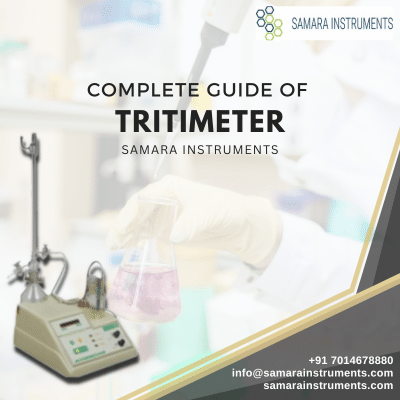What is a Titrimeter?
A titrimeter, often referred to as a titration apparatus or titration system, is an analytical instrument used to determine the concentration of a particular substance in a solution. This concentration can be quantified through a process called titration, where a known reagent (titrant) is slowly added to the sample until the reaction is complete. The titrimeter accurately measures the volume of titrant required to reach this endpoint, allowing for precise calculations of the sample’s concentration.
When it comes to accurate and precise chemical analysis, a titrimeter is an indispensable instrument in the laboratory. This versatile device plays a vital role in various industries, including pharmaceuticals, food and beverage, environmental monitoring, and research. In this article, we will explore the titrimeter, its functions, and why it is a must-have for any serious laboratory.
Key Components of a Titrimeter
A typical titrimeter consists of several key components:
- Burette: This is a long, graduated tube with a stopcock at the bottom. It holds the titrant and allows for precise control of the titrant’s volume during titration.
- Reagent Reservoir: The reagent reservoir holds the titrant solution and is connected to the burette, ensuring a continuous supply of the titrant during the titration process.
- Analytical Balance: To achieve accurate results, an analytical balance is used to measure the sample’s mass or volume.
- Indicator: In some titrations, an indicator is added to the sample to signal the endpoint of the reaction.
Types of Titrimeters
There are various types of titrimeters, each suited for specific analytical applications. The most common types include:
- Acid-Base Titrimeter: Used to determine the concentration of an acid or base in a solution.
- Redox Titrimeter: Employed in redox reactions to determine the concentration of an oxidizing or reducing agent.
- Precipitation Titrimeter: Used to quantify the concentration of specific ions by causing a precipitate to form.
- Complexometric Titrimeter: Employed to determine the concentration of metal ions that can form stable complexes with certain ligands.
Why Titrimeters Are Essential
Titrimeters offer several key benefits:
- Accuracy: Titrimetry provides highly accurate results, making it a preferred method for quantitative analysis.
- Versatility: Various titrimetric methods can be applied to different types of chemical reactions, making it suitable for a wide range of applications.
- Cost-Effective: Titrimetry is a cost-effective method as it doesn’t require expensive equipment or reagents.
- Quality Control: In industries such as pharmaceuticals and food production, titrimeters are essential for maintaining product quality and consistency.
Applications of Titrimeters
The applications of titrimeters are diverse, and they are used in various industries and research settings. Let’s explore some of the key applications:
- Pharmaceutical Industry: Titrimeters play a critical role in pharmaceutical research and manufacturing. They are used to determine the concentration of active pharmaceutical ingredients (APIs) in formulations and ensure that products meet quality standards.
- Food and Beverage Industry: In food production, titrimeters are used to monitor acidity, salt content, and other key parameters in products such as sauces, soft drinks, and dairy products. This ensures that consumers receive consistent and safe products.
- Environmental Analysis: Environmental laboratories use titrimeters to analyze water quality, including the determination of pollutants like ammonia, chlorine, and heavy metals. These analyses are essential for ensuring clean and safe water sources.
- Academic and Research Laboratories: Titrimeters are widely used in educational institutions and research laboratories to teach students and conduct experiments in fields ranging from chemistry to biochemistry.
- Chemical Manufacturing: In chemical industries, titrimeters are essential for quality control and process optimization. They help in determining the purity of chemicals and assessing the progress of chemical reactions.
Choosing the Right Titrimeter
When selecting a titrimeter, it’s essential to consider your specific analytical needs. Factors to take into account include the type of titration you’ll be performing, the expected concentration range of your samples, and the level of automation and precision required.
Some modern titrimeters come with automatic titration systems, computer interfaces, and integrated software, making the titration process more efficient and accurate. Always ensure that the titrimeter you choose aligns with the goals of your laboratory or industry.
Conclusion
In conclusion, titrimeters are indispensable tools for laboratories across various industries. Their accuracy, versatility, and cost-effectiveness make them essential for ensuring precise chemical analysis and maintaining product quality. Whether you’re in pharmaceuticals, food production, or environmental monitoring, a titrimeter is a valuable asset for your laboratory.
By selecting the right titrimeter and applying the appropriate titration method, you can achieve accurate and reliable results that are crucial for research, quality control, and compliance with industry standards. As technology continues to advance, titrimeters are becoming even more user-friendly, making them accessible to a wider range of users and industries.
Now that you’ve gained a deeper understanding of the titrimeter and its applications, you’re well-equipped to harness the power of this essential tool in your laboratory or industry.
To purchase this product you connect with us over whatsapp


